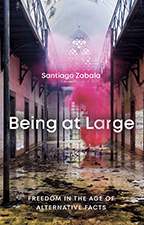
Santiago Zabala
McGill-Queen’s University Press, 2020; 200 pp;
ISBN: 978-0-2280-0191-1.
By Charles Reeve
The summer of lies: dispiritingly, that’s probably the best we can say of 2020, with its tsunami of ass-covering prompted by rising police impunity despite outcries over law enforcement’s racist violence and by COVID-19’s differential impacts. And then there’s the uber-lie justifying these mendacities — from sheriff’s deputy Alan Strickland’s misrepresentation of his assault on Toronto Raptors’ president Masai Ujuri to the flood of White House fabrications — as “alternative facts,” a bit of chicanery debuted by Kellyanne Conway, former U.S. Counsellor to the President, during Trump’s first month in office. Less well-noted is the violence of Conway’s rhetorical structure, which is the focus of Santiago Zabala’s intriguing, if uneven, book — or perhaps I should say “books,” a key difficulty of this volume being that it is two projects, linked neither as clearly nor inevitably as Zabala claims.
Paradoxically, the main project is the one named in the subtitle (and accorded less space). Its key argument is that, in the age of alternative facts, freedom diminishes, disappears or, most pointedly, is disappeared. Conway’s assertion that Sean Spicer “gave alternative facts” when he exaggerated the attendance at Donald Trump’s inauguration wasn’t an invitation to respectful disagreement. Instead, it introduced a situation in which the state dictates the facts and forcibly compels its citizens to agree that those claims are indeed facts — whether true or not. Sometimes that force looks like neglect, as when COVID-19 affects BIPOC communities at disproportionately high rates. Other times, it looks targeted, as when overpolicing and disproportionate incarceration beset those same communities. Either way, state-sponsored injury and death ravage any group misfortunate enough to put the lie to Trump’s boasts that he is making America great again.
From there, the crisis spreads across the United States and throughout neoliberalism’s sphere. Hence the state of affairs driving Zabala’s crucial thesis: since any robust conception of freedom must include the freedom to interpret as one sees fit, militarized wars on interpretation — “alternative facts” being the signal example — also are militarized wars on freedom. Drawing on Gianni Vattimo’s work, Zabala posits that this context’s greatest crisis is the imposition of the emergency of no emergency, as when armed and armoured government agents descend to enforce the diktat that all is well. COVID-19 will blow over when spring comes, law and order will solve the world’s problems and a jaunty spritz of pepper spray will dispatch any questions of constitutionality.
The prohibition of interpretation equals unfreedom, however, only if interpretation equals freedom. And that’s where Zabala’s “Being at Large” project comes in, organized around the discourse of Martin Heidegger, Hans-Georg Gadamer and Richard Rorty and concluding that (the italics are Zabala’s), “To interpret is already to change the world because it always includes a new contribution”. True as that claim is, it’s also just so much unreconstructed humanism. It’s not new and it doesn’t need italics — let alone a 60-page explication of Heidegger, Gadamer and Rorty, with a side of Derrida. (To be clear, I’m sympathetic, but the value proposition doesn’t cash out.) Nor does it follow, as Zabala hopes it does, that hermeneutics’ interpretative legacy is the one true defence against Conway’s rhetorical flourish and the ideological and physical violence it foreshadows. However, what does follow — and why I value Zabala’s argument, as impatient as it made me — is the deluge of state-sponsored violence sent out to enforce the President’s worldview. Interestingly, when Conway introduced the phrase “alternative facts,” the interviewer, Chuck Todd, came back with a response worth repeating. “Alternative facts are not facts,” he said firmly. “They’re falsehoods.”
_______________________________________________________________
Charles Reeve is an associate professor, Visual & Critical Studies/chair, Arts & Science program area, OCAD University